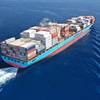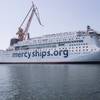Bath Iron Works, a subsidiary of General Dynamics, has received a contract from the U.S. Navy to explore advanced concepts for a Focused Mission High-Speed Ship. FMHSS is an integrated surface combatant capability envisioned to operate in littoral (coastal) areas against terrorist threats, high-speed swarm boats, mines and diesel submarines. It may also be called upon to carry logistics supplies or personnel and equipment for Special Operations Forces and the U.S. Marine Corps. It will incorporate state-of-the-art materials, modular mission packages, and a reconfigurable platform design to provide the Navy with a highly flexible concept for future littoral operations. The mission capability of the FMHSS will play a pivotal role in assuring the access for joint and coalition forces into contested coastal regions around the world. The results of this study will assist the Navy in defining requirements for the rapidly emerging Littoral Combat Ship (LCS) Program. As many as 30 - 60 LCS ships are planned, with construction to begin in 2005. Earlier construction may be required by the Navy in order to accelerate defense against growing worldwide threats and terrorist operations.
The General Dynamics team will be led by Bath Iron Works, and includes leading U.S. and international defense contractors. Team members are The Boeing Company; Austal, USA, of Mobile, Alabama; British Aerospace Corporation (BAE); Maritime Applied Physics Corporation; CAE Marine Systems and five other General Dynamics business units.
The team will develop an integrated system that delivers significantly enhanced capabilities to naval, joint and coalition forces operating within the littorals. In defining system design characteristics, the team will address FMHSS integration with FORCEnet, the information network into which the Navy will integrate sensors, decision aids and weapons, as well as other joint and coalition information networks. The spectrum of technologies to be evaluated by the team will include all forms of remotely deployed and operated vehicles, distributed sensors, modular payloads, weapons, communications, command and control and automation systems as well as advanced propulsion technologies and hull construction materials.
The team has chosen to base its FMHSS hull design on advanced Trimaran hull form technology. Results of recent Office of Naval Research-sponsored high-speed Trimaran studies completed by Bath Iron Works will be coupled with an existing Trimaran design available through Austal, USA, to create a highly automated ship capable of speeds in excess of 50 knots. This ship will have significantly lighter displacement than the Navy's FFG 7 Oliver Hazard Perry Class of frigates designed and built at Bath Iron Works and will be capable of extended independent operations with a crew of just 25 - 30. The advanced Trimaran design offers outstanding efficiency and performance in all sea conditions, endurance and reliability for sustained independent operations and a high degree of flexibility/adaptability to meet evolving military requirements through open architecture and modular configuration. The system will enable advanced operational concepts such as those employing high speed, enhanced maneuver, distributed forces and reduced signatures as well as the ability to efficiently embark from a broad array of aircraft, amphibious, land and marine vehicles.
Subscribe for
Maritime Reporter E-News
Maritime Reporter E-News is the maritime industry's largest circulation and most authoritative ENews Service, delivered to your Email five times per week










